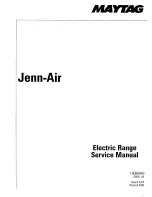
12
Oven Vent
1. Oven Vent (coil element model)
1. Oven Vent (ceramic glass model)
The oven vent releases hot air and moisture from the oven, and
should not be blocked or covered. Doing so will cause poor air
circulation, affecting cooking and cleaning results. Never set
plastics, paper or other items that could melt or burn near the
oven vent.
On coil element models, the element can be used when the oven
is in use as long as the cookware does not extend more than 1 in.
(2.5 cm) over the element.
On ceramic glass models, Cooktop Polishing Creme can be used
to minimize soiling in the vent area. See “Assistance or Service”
section to order.
To Minimize Soiling (ceramic glass models):
1.
Use the Self-Cleaning cycle often, before the oven becomes
too soiled.
2.
Before Self-Cleaning, apply Cooktop Polishing Creme on the
control panel directly above the vent area. On stainless steel
models, do not allow creme to contact stainless steel.
3.
Rub creme into surface with a damp paper towel or soft
cloth. Continue rubbing until white film disappears.
Baking and Roasting
Before baking and roasting, position the racks according to the
“Positioning Racks and Bakeware” section. When roasting, it is
not necessary to wait for the oven to preheat before putting food
in, unless recommended in the recipe.
To Bake or Roast:
1.
Push in and turn the oven control knob to the desired
temperature setting. The OVEN ON and OVEN HEATING
lights will turn on and the set temperature will appear in the
display for 5 seconds.
On some models, set the oven selector to BAKE and turn the
oven temperature control knob to the desired temperature
setting. The OVEN ON indicator light will turn on and will turn
off once the oven is preheated.
2.
Place food in oven.
The bake and roasting elements will turn on and off to keep
the oven temperature at the setting. The OVEN ON indicator
light(s) will turn on and off with the elements.
3.
Push in and turn oven control knob to OFF when finished.
On some models, turn both the oven selector and oven
temperature control knob to OFF. The OVEN ON indicator
light will turn off.
Broiling
Broiling uses direct radiant heat to cook food. Changing the
temperature when broiling allows more precise control. The lower
the temperature, the slower the cooking. Thicker cuts and
unevenly shaped pieces of meat, fish and poultry may cook
better at lower broiling temperatures.
■
Use only the broiler pan and grid provided with the range. It is
designed to drain juices and help prevent spatter and smoke.
■
For proper draining, do not cover the grid with foil. The
bottom of the pan may be lined with aluminum foil for easier
cleaning.
■
Trim excess fat to reduce spattering. Slit the remaining fat on
the edges to prevent curling.
■
Pull out oven rack to stop position before turning or removing
food. Use tongs to turn food to avoid the loss of juices. Very
thin cuts of fish, poultry or meat may not need to be turned.
■
After broiling, remove the pan from the oven when removing
the food. Drippings will bake on the pan if left in the heated
oven, making cleaning more difficult.
Before broiling, position rack according to Broiling Chart. It is not
necessary to preheat the oven before putting food in unless
recommended in the recipe. Position food on grid in the broiler
pan, then place it in the center of the oven rack. Close the door to
the broil stop position to ensure proper broiling temperature.
1
1





































